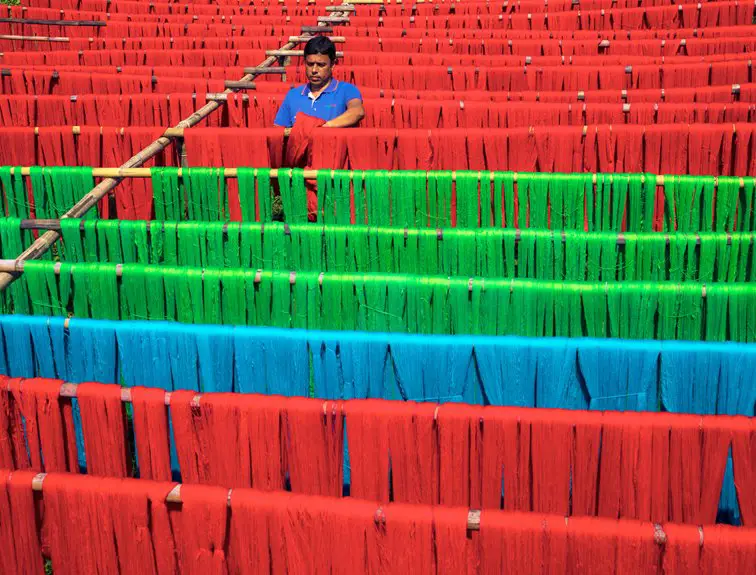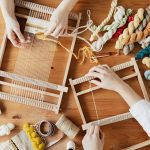If you’re exploring narrow fabric manufacturers in Bangladesh, you’ll find firms specializing in jacquard tapes, elastic bands, webbings, and ribbons that serve global markets including Europe and North America. These manufacturers use advanced weaving and dyeing machinery, hold certifications like ISO 9001 and OEKO-TEX, and emphasize sustainable practices. You’ll also see how they tackle challenges such as rising costs and evolving fashion demands. There’s more to uncover about their innovations and industry outlook beyond this snapshot.
Table of Contents
Key Takeaways
- Bangladesh produces diverse narrow fabrics like jacquard tapes, elastic bands, webbings, ribbon tapes, and twill tapes for various industries.
- Leading manufacturers include Apex Group (elastic tapes), RFL Group (seat belts), Fakir Apparels (jacquard ribbons), and Pacific Jeans (sustainable fabrics).
- Advanced weaving machinery, automation, and strict quality standards like ISO 9001 and OEKO-TEX ensure high-quality narrow fabric production.
- Major export markets are Germany, the UK, Italy, the US, Canada, Japan, and South Korea, with growing focus on sustainability practices.
- Challenges involve raw material costs, energy shortages, and machinery upgrades, while future trends emphasize automation, eco-friendly products, and digitalization.
Key Types of Narrow Fabrics Produced in Bangladesh
Narrow fabrics play an important role in various industries, and Bangladesh manufacturers produce several key types to meet diverse needs.
When you look at their offerings, you’ll find jacquard tapes, known for intricate patterns and durability. They also produce elastic bands essential for apparel and medical uses, providing stretch and support where needed.
Webbing straps are another common product, significant in bags, safety equipment, and furniture. Additionally, ribbon tapes cater to decorative and functional purposes in gift wrapping and textiles.
You’ll also encounter twill tapes used in sewing and garment construction for reinforcement. These manufacturers focus on quality and variety, ensuring you can find narrow fabrics that suit everything from fashion and industrial applications to household goods, all crafted with precision to meet your specific requirements.
Leading Manufacturers and Their Specializations
Bangladesh hosts a range of manufacturers who excel in producing specific types of narrow fabrics tailored to different industries.
When you explore leading companies like Apex Group, you’ll find they specialize in high-quality elastic tapes and webbings, ideal for the garment sector.
Meanwhile, RFL Group focuses on producing durable seat belts and industrial straps that meet global safety standards.
If you need customized jacquard ribbons or decorative trims, manufacturers like Fakir Apparels have honed their expertise in intricate weaving techniques.
You’ll also find firms such as Pacific Jeans that prioritize sustainable narrow fabrics, catering to eco-conscious brands.
Technologies and Machinery Used in Production
You’ll find that narrow fabric manufacturers in Bangladesh use advanced weaving machines to guarantee high-quality production.
They’ve also integrated modern dyeing and finishing technologies to enhance fabric durability and appearance.
Plus, automation plays a big role in speeding up processes and maintaining consistency.
Advanced Weaving Machines
Cutting-edge weaving machines have transformed the production of narrow fabrics, boosting efficiency and quality. When you invest in these advanced looms, you benefit from faster production speeds and greater precision.
Modern rapier, air-jet, and projectile looms allow you to create intricate patterns with minimal waste. These machines feature automated tension controls and electronic jacquard systems, letting you maintain consistent fabric strength and design accuracy.
You’ll also appreciate how their user-friendly interfaces simplify operation and reduce downtime. By adopting such technology, you can keep up with the rising demand while ensuring high-quality narrow fabric production.
In short, advanced weaving machines are essential if you want to stay competitive and meet the exacting standards of today’s textile market.
Dyeing and Finishing Technology
After weaving high-quality narrow fabrics with modern machines, the next step is to enhance their appearance and durability through advanced dyeing and finishing technologies.
You’ll find that manufacturers in Bangladesh employ state-of-the-art jet dyeing machines and pad-dry-cure systems to guarantee even color penetration and fast processing. These technologies help you achieve vibrant, long-lasting colors while maintaining fabric strength.
Finishing processes like calendaring, heat setting, and coating improve surface smoothness, dimensional stability, and resistance to wear. By using eco-friendly chemicals and water-saving methods, these factories minimize environmental impact, which you’ll appreciate in sustainable production.
Automation in Fabric Production
While many traditional steps remain essential, automation has transformed fabric production in Bangladesh by streamlining processes and boosting efficiency.
You’ll find advanced machinery like computerized jacquard looms and automatic warping machines that cut down production time and minimize errors. Automated cutting machines guarantee precise fabric dimensions, reducing waste and improving quality control.
Additionally, integrated software systems help you monitor every stage, from yarn tension to fabric finishing, allowing real-time adjustments. Robotics assist in repetitive tasks, freeing up your workforce for more skilled roles.
By adopting these technologies, you can meet high-volume demands without compromising on consistency. Automation not only enhances productivity but also elevates product standards, giving you a competitive edge in the narrow fabric market.
Embracing these tools positions your operations for future growth and innovation.
Quality Standards and Certifications
Many narrow fabric manufacturers in Bangladesh prioritize strict quality standards and certifications to meet both local and international demands.
When you choose a supplier here, you’ll find they often comply with ISO 9001 for quality management and OEKO-TEX for guaranteeing textiles are free from harmful substances.
These certifications guarantee that the products you receive maintain consistent quality and safety.
Additionally, many manufacturers implement rigorous in-house quality control processes, including regular inspections and testing during production.
By focusing on these standards, manufacturers help you avoid defects and guarantee durability in narrow fabrics.
Export Markets and International Partnerships
You’ll find that narrow fabric manufacturers in Bangladesh target key export markets like Europe and North America to expand their reach.
Building strong international partnerships helps them stay competitive and meet global demand efficiently.
Understanding these collaboration strategies reveals how they maintain steady growth in the global textile industry.
Key Export Destinations
Because Bangladesh has established a strong reputation for quality and competitive pricing, narrow fabric manufacturers have secured key export markets across Europe, North America, and Asia.
When you explore their export destinations, you’ll find countries like Germany, the UK, and Italy leading in Europe. In North America, the United States and Canada are major buyers, relying on Bangladesh’s ability to deliver consistent, high-quality narrow fabrics.
Asian markets, including Japan and South Korea, also play a vital role due to their demand for specialized fabric products. By targeting these regions, manufacturers tap into diverse industries like fashion, automotive, and home textiles.
This strategic focus guarantees you can access fabrics that meet global standards and market trends efficiently.
Global Collaboration Strategies
Although traversing international markets can be complex, narrow fabric manufacturers in Bangladesh have developed effective global collaboration strategies that strengthen their export reach and foster valuable partnerships.
You’ll find these manufacturers actively seeking alliances with overseas buyers, designers, and suppliers to stay competitive. They focus on understanding market demands and tailoring products accordingly, which helps build trust and long-term relationships.
Many leverage trade shows and digital platforms to connect globally, making communication seamless and efficient. By collaborating with international partners, they gain access to new technologies and quality standards, enhancing their offerings.
When you engage with these manufacturers, you benefit from their commitment to meeting global expectations, ensuring reliable supply and innovation aligned with worldwide trends.
Sustainability Practices in Narrow Fabric Manufacturing
When you explore narrow fabric manufacturing in Bangladesh, you’ll notice many companies are adopting sustainability practices to reduce their environmental impact. You’ll find efforts such as using eco-friendly raw materials, implementing energy-efficient machinery, and recycling waste materials. These initiatives not only conserve resources but also boost industry reputation globally.
| Practice | Description | Benefit |
|---|---|---|
| Eco-friendly Materials | Use of organic or recycled fibers | Reduces chemical pollution |
| Energy Efficiency | Adoption of low-energy machines | Cuts greenhouse gas emissions |
| Waste Recycling | Reuse of fabric scraps | Minimizes landfill waste |
| Water Conservation | Closed-loop water systems | Saves water resources |
| Chemical Management | Safer dyes and treatments | Protects worker health |
Challenges and Future Trends in the Industry
Sustainability efforts have set a strong foundation for narrow fabric manufacturers in Bangladesh, but the industry still faces significant challenges.
You’ll encounter issues like fluctuating raw material costs, energy shortages, and the need to upgrade outdated machinery. Meeting international quality standards while keeping prices competitive isn’t easy either.
However, staying ahead means embracing automation and digitalization to boost efficiency. You’ll also find growing demand for eco-friendly products pushing manufacturers toward innovative materials and processes.
As global markets shift, adapting to fast fashion trends and diversifying product lines will be essential. If you focus on these future trends, your business can thrive despite obstacles.
Embracing technology and sustainability hand-in-hand sets the stage for long-term success in this evolving industry.
Frequently Asked Questions
What Is the Average Cost of Narrow Fabric in Bangladesh?
You’ll find the average cost of narrow fabric in Bangladesh ranges between $1 to $3 per yard, depending on quality and type. Prices can vary, so it’s smart to compare suppliers before deciding.
How Long Does It Take to Produce a Batch of Narrow Fabric?
Producing a batch of narrow fabric takes about 3 to 7 days, like a clock ticking steadily. You’ll see variations depending on complexity, machinery, and order size, but manufacturers work efficiently to meet your deadlines.
Are There Custom Design Services Available for Narrow Fabrics?
Yes, you can get custom design services for narrow fabrics. Many manufacturers work closely with you to create unique patterns, colors, and textures that suit your specific needs, ensuring your project stands out perfectly.
What Are the Main Raw Materials Sourced Locally?
Think of raw materials as the roots feeding a tree—cotton, jute, and polyester are the main locally sourced fibers you’ll find. They keep the fabric industry thriving, blending tradition with modern needs in every thread.
How Do Manufacturers Handle Labor Welfare and Worker Safety?
You’ll find manufacturers prioritize labor welfare by providing fair wages, safe working conditions, and regular training. They also implement safety measures, guarantee proper ventilation, and comply with local labor laws to protect workers’ health and rights.
- Boron Carbide Fabric Vs Kevlar: Comparing Advanced Materials - June 21, 2025
- Best Kevlar Fabric Shears: Tools for Safe and Precise Cutting - June 21, 2025
- Aramid Fabric Vs Kevlar: Explaining the Differences - June 21, 2025





